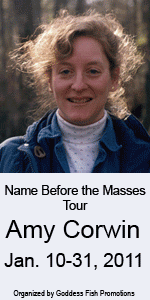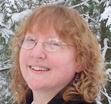Guest Blogger Amy Corwin
Write About welcomes Amy Corwin as she kicks off her January blog tour!
Amy Corwin is a charter member of the Romance Writers of America and recently joined Mystery Writers of America. She has been writing for the last ten years. She writes romance, historical and cozy mysteries. To be truthful, most of her books include a bit of murder and mayhem since she discovered that killing off at least one character is a highly effective way to make the remaining ones toe the plot line. Amy's books include the three Regency romantic mysteries, I BID ONE AMERICAN, THE BRICKLAYER'S HELPER, and THE NECKLACE; Regency mysteries, THE VITAL PRINCIPLE, and A ROSE BEFORE DYING; and her first cozy mystery, WHACKED!, will come in in 2012 from Five Star. Join her and discover that every good romance has a touch of mystery.
KD: Welcome, Amy. Romance with a touch of mystery sounds like wonderful combination. Two of your books involve the Second Sons Inquiry Agency. Is this type of agency based in historical fact? Tell us a little bit about the agency and how it operates in the stories.
AC: The Second Sons Inquiry Agency is entirely fictional, but it's based upon a lack of such things, rather than the existence of them. While the Bow Street Runners had already been established, it only operated within the environs of London, leaving a bit of a lack outside the city. Certainly, there were local constables, but the regularization of a police force as we know it today, along with forensics, developed later in the 19th century when Peel initiated a series of reforms around 1833. Nonetheless, there were "thief-takers" or private inquiry agents that could be employed by anyone interested in doing so. So I extrapolated from that, and from the Bow Street Runners.
It seemed logical for a number of reasons. Knighton Gaunt, the founder of Second Sons, was himself a second son and one accused of murdering his father. He developed an understandable drive to discover the truth from this experience and once he cleared his name, he found that he was not interested in the standard careers generally pursued by the younger brothers of the social elite: the military or the church. So Gaunt became my first sleuth and naturally, his agency grew to include others who found themselves unwilling for whatever reason to pursue more acceptable careers.
The fact that this type of career was, at that time, was not considered socially acceptable work for a gentleman as also intriguing to me, because it means anyone engaged in it must be willing to give up his or her social position. An inquiry agent (or thief-taker) was on par with a tradesman, not a gentleman, and he had to work among the criminal classes. Acquaintances and friends might even shun one who decided to become an inquiry agent, so it was a difficult decision to be sure. This inevitably leads to personal issues as well as the professional issues of successfully identifying a criminal without benefit of all the forensics we rely on today. My final reason for creating a fictional agency was the fear that if I simply wrote about an amateur detective, I might eventually come to feel about him the way Sir Conan Doyle felt about Sherlock. After all, he attempted to kill off Sherlock at least once. With an agency, I can explore other characters and situations.
KD: I've often wondered what second and subsequent sons did with themselves in those days. I think you gave them a wonderful occupation in your stories. Your regency novels present several specialized topics such as roses and spiritualism. How much research do you do and do you stress about getting the details correct?
AC: I do an enormous amount of research and I make every attempt to get the details right as far as I am able. I've researched and grown old garden roses for a number of years and at one time, had nearly 150 varieties in my garden. I became fascinated with them because I found I could not grow Hybrid Teas and desperately wanted to grow roses. When I found old garden roses, I was amazed. No spraying and very little maintenance and yet they grow like crazy. In our area, the Teas and Chinas do particularly well, and interestingly enough, they contributed to the development of the fussier Hybrid Tea which I can't grow.
The spiritualism was insisted upon by the character, Prudence Barnard. It wasn't as popular in the Regency as it was in the later Victorian period, but its roots were already developing. Unfortunately, spiritualists were largely con men and women, who found the general public's need for a more spiritual outlook to offset the increasingly industrial/mechanical developments as society moved from an agrarian culture to an industrialized one.
However, back to Pru. Her father dragged her around with him as he pursued an interest in ghosts and the spirit world. He wanted to prove the existed. Unfortunately, their research pretty much proved the opposite for Pru was almost always able to show some more earthly reason for the disturbances. When he died, it left her destitute and for an educated woman in her position, that meant becoming a governess or companion. Pru soon realized, however, that others saw her experience with her father as an ability to see into the spirit world, rather than disprove it. Women in her social class were happy to have her as a guest, particularly if they thought she could give them the thrill of speaking with the dearly departed.
So rather than face the grim life of working as a companion or governess, she became what is essentially a professional guest. While no one would have claimed to be a professional guest, it is actually not unheard of. Many penniless gentlemen lived precisely in the same way, by moving from house to house as a guest, fed and housed in return for being amusing and "rounding out the numbers" at the dinner table. A few years later, when spiritualism really took off, spiritualists picked up where these penniless gentlemen left off, traveling from house to house and offering the amusement of spirit sessions. You'll note I try to avoid the use of the word séance, since that did not come into use until a few years after the close of the Regency period.
KD: 150 varieties of roses? Wow, that's true dedication! Writing mysteries involves intricate plotting of details. Are you a detail-oriented person? How do you keep track of the details as you draft?
AC: Yes. My day job is as a computer specialist and I have an extensive background in programming. I've met a lot of other writers who were also programmers. I always work out an outline and worry over every little detail. I have software called Personal Brain I use to keep track of everything. Because I reuse characters like Pru and Knighton, I don't want to have to recreate info on them or copy it over from book to book. The Brain lets me create things once and then link them visually to anything else. So I can continually link characters, settings, anything from threads about one book to the tread of another. Spreadsheets also help as continuity checks. Over time, my methods morph and change, but no matter what method I use for a particular book, I always employ something.
KD: You are lucky to have great software skills to assist you with your writing. Would you say your mystery stories are dark and serious or more lighthearted and comic? What do you expect readers to enjoy most when they read one of your mysteries?
AC: No matter how dark they get, there is always one bright, humorous thread, comic relief, if you will. In The Vital Principle, some terrible things are revealed during the investigation. Nonetheless, I have one character who is rather endearingly funny to lighten the book. If I don't have any humor at all, I find I lose interest in writing. Some of my books are much more broadly comical, particularly those involving the Archer family, but even in the funny ones, there are dark threads. After all, if someone has been driven to commit murder, there is something that caused it, some blackness. But amidst the darkness, there must always be light, and I try to end every book on a light note. A happy ending, and hope, are very important to me, and I hope to my readers.
KD: Who are some of your favorite mystery authors/stories, and why do you admire them?
AC: I love Charles Todds' mysteries, set just after WWI. They are a fascinating glimpse into a bygone era. The characters are so tortured and so real that you can't help but feel for them. I also enjoy Charlotte MacLeod's mysteries, all of them, as they are such lighthearted fun. The Convivial Codfish is an absolute riot. Elizabeth Peters, Agatha Christie, and so many other great mystery writers. I love both the light stories and the dark, although I shy away from the ones that are too grim.
KD: Tell us a little about your background. What was it like growing up? Were you a good student in school?
AC: I was a very boring little girl, I'm afraid. I always followed the rules because I thought it was silly not to. I was a moderately good student, particularly in the sciences. At one point, I thought I might become a biologist, but I eventually settled for marrying one, instead. The truth is, I was one of those students who enjoyed school. I've always liked learning, and I still do.
KD: Talk a little bit about your particular brand of creativity. What do you think your writing has that other authors don't have?
AC: Fun and yet serious. No matter what horrible events lead to a murder, there is always hope that the bad guy will be caught. Justice will be served. And people will find happiness. If there's one message I want to relay it's that there is always hope.
KD: Tell us about your writing process. Do you write every day? Do you have a favorite place to write?
AC: I try to write most days, but because of the stress of my day job, I do give myself a day off on weekends to recharge the batteries. The thing is, the more you write, the more you want to write and the more ideas you get. So you sort of have to write.
KD: What is your time-frame for writing a full-length novel? Do you work on one story at a time or do you have several projects going at once?
AC: I'm the world's slowest writer. It takes me a long time to flesh out an idea, even before I write it down. Then about a week to develop an outline. After that, it takes about 4-6 months to write the first draft. I let it rest and work on something else, then it takes another 4-6 months for edits. Another couple of months to send through editors, and so on. Books coming out this year were written a minimum of two years ago.
KD: Where can readers purchase your books?
AC: Almost anywhere ebooks are sold, including Barnes and Noble/Nook, Amazon/Kindle, Smashwords, and directly from the publisher in the case of The Wild Rose Press books or Five Star/Gale.
KD: Thanks for joining us today, Amy. Amy will be giving away a $25 Amazon GC to one randomly drawn commenter during the tour, so please leave Amy a comment. You can also find Amy on the web:
Website: http://www.amycorwin.com
Twitter: http://twitter.com/amycorwin
Facebook: http://www.facebook.com/AmyCorwinAuthor
Blog: http://amycorwin.blogspot.com
Stop by Amy's other tours this month!
January 17: Carrie Ann Ryan's Blog
January 24: We Fancy Books
January 31: Realmantic Moments
Amy's tour arrangements by Goddess Fish Promotions:  http://www.goddessfish.com
http://www.goddessfish.com




